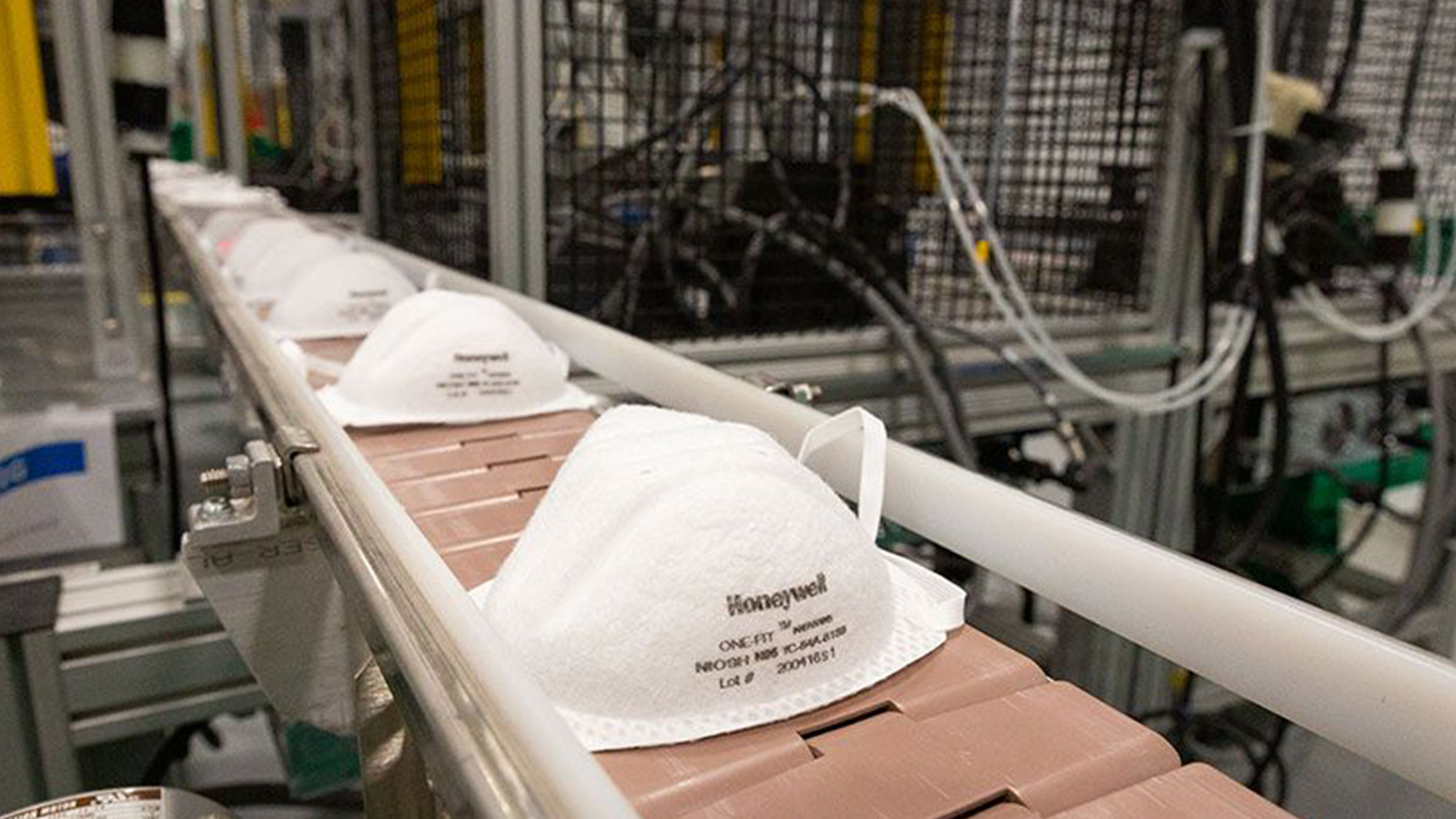Stay Up to Date
Submit your email address to receive the latest industry and Aerospace America news.
Plans call for producing 20 million N95 masks a month
Honeywell workers began clearing out jet engine turbines from a storage building in Phoenix last month, moving them elsewhere on the campus of Honeywell’s Aerospace division headquarters. Unbeknownst to these workers, the president of the United States would come for a visit five weeks later to highlight the work now underway in this former storage room as an example of the country’s anti-virus industrial mobilization.
The building was one of two Honeywell facilities remodeled to manufacture N95 masks, so named because they filter out 95% of airborne particles above a certain size. The 500 workers inside the Phoenix plant must churn out thousands of masks every week to help meet the U.S. Department of Health and Human Services’ goal to produce 500 million N95 masks over the next 18 months.
Quickly setting up the workspace and tooling to achieve such a high rate of production required collaboration between the Honeywell Aerospace division and the company’s Industrial Safety business, which before the coronavirus pandemic had manufactured protective equipment like eye goggles and face shields for industrial workers, including those in the oil and gas industries.
“What that’s allowed us to do is take existing products that had historically been used in more of the industrial context and be able to provide those out to the first responders and people who are out there on the front lines today,” said Brian Hovey, chief marketing officer for Honeywell Industrial Safety.
After assessing available space in all of Honeywell’s U.S. locations, executives in late March chose the Phoenix building for renovation. That work swiftly began, while elsewhere on the aerospace campus, technicians continued to build jet engines and auxiliary power units that provide electricity for onboard aircraft systems, the U.S. government having deemed their work essential.
The storage building’s transformation took most of April. Masked and gloved workers relocated inventory, replaced flooring and installed new lights. They cleared about 2,800 square meters, roughly half the size of an American football field, to make way for two N95 assembly lines and the machines needed to mold and cut the masks and weld loops of elastic to them.
Speedily purchasing this equipment was another hurdle.
“This isn’t equipment that’s off-the-shelf ready,” Hovey said. “It has to not only be procured, but it has to be customized specific to the production.”
Here, the “big time savings” was the knowledge and existing supply chain from the Industrial Safety division, Hovey said, which provided the expertise in setting up the assembly lines and suppliers who built the required tooling.
“We were able to really build off of our strong supplier relationships, and given the criticality of the need, get product faster than we might historically,” he said. “And we made some quick purchase decisions around some of the machines that were most critical, and I think that helped reduce time.”
Another advantage for the workers remodeling the Phoenix facility was being able to reference decisions made at a Honeywell plant in Smithfield, Rhode Island, the other facility converted for N95 production. This building, already part of Honeywell’s Industrial Safety division, began N95 production in mid-April, churning out the respirators in addition to the safety glasses and face shields already made at that particular factory.
Through this combination of “hard work, good coordination and strong execution,” the Phoenix remodeling was completed in late April, Hovey said. But there was no time to rest. N95 production commenced on April 30, with workers delivering the first 4,800 masks to the U.S. Department of Health and Human Services on May 1.
All told, the transformation took five weeks, which President Donald Trump praised as a “truly miraculous achievement” during his visit to the plant last week.
“Think of this, what you’ve done,” Trump said according to a livestream of his remarks to Honeywell employees and reporters. “You’re part of this incredible industrial mobilization.”
In the coming weeks, Honeywell plans to ramp up production at the Phoenix and Smithfield facilities to churn out a combined 20 million masks a month. The company in April also received a separate contract from the Defense Department to produce 38 million masks by October.
How long this mobilization will last remains an open question. The Centers for Disease Control and Prevention reports that as of early May, the number of people testing positive for the coronavirus in the U.S. is declining, but medical experts on the White House task force have warned of a second wave of infections as states begin to reopen nonessential businesses and ease shelter-in-place orders.
Whatever the reality, Hovey indicated Honeywell’s N95 production is here to stay.
“I think we’ve also come to realize that it’s critical for us as a society to make sure that we’re prepared in the future as well,” he said, adding that “we made these investments not just thinking about the immediate need, but really viewing this as these are strategic investments for us, and our plans are to continue producing here into the future.”
About cat hofacker
Cat helps guide our coverage and keeps production of the print magazine on schedule. She became associate editor in 2021 after two years as our staff reporter. Cat joined us in 2019 after covering the 2018 congressional midterm elections as an intern for USA Today.
Related Posts
Stay Up to Date
Submit your email address to receive the latest industry and Aerospace America news.




